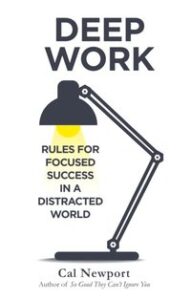What is Deep Work and Shallow Work?
Deep Work: Professional and challenging activities performed in a state of distraction-free concentration that push your cognitive capabilities to their limit. These efforts create new value, improve your skill, and are hard to replicate. This requires our full attention on one activity and can’t be done if we are multitasking.
Shallow Work: Non-cognitively demanding and easy activities that can often be performed while distracted and does not require our full attention. These efforts tend to not create much new value in the world and are easy to replicate.
The Deep Work Hypothesis: The ability to perform deep work is becoming increasingly rare at exactly the same time it is becoming increasingly valuable in our economy. As a consequence, the few who cultivate this skill, and then make it the core of their working life, will thrive.
Part 1: Why Deep Work is Valuable, Rare and Important
The two most important skills to have in the 21st century is quickly be able to learn difficult things and produce high quality results in terms of both quality and speed. In order to produce the best results we are capable of and solve complex problems we need to commit to deep work. Our high quality results produced are strongly correlated with the time we spend in deep work.
Deep work is an essential skill to have if we want to achieve our goals in life. This skill is built on two other skills. The ability to focus intensely and the ability to overcome the desire for distraction, both these can and should be trained. The more we practice deep work the easier it becomes.
Human get in general a lot of fulfilment after completing a challenging task that has really pushed us to the limit.
During work, if our priorities are not clear we normally do the easiest activities in order to show that we are productive. This behaviour often leads us to focus on shallow work. We need to prevent this tendency by identifying the important and challenging activities that are harder in the short-term, but reward and bring fulfilment to us in the long-term. If we spend a lot of time doing shallow work then our ability to do deep work will be lowered.
The ability to do deep work also also makes you more attractive on the job market since companies look more for employees who can complete complex tasks. This means those who do not have the ability to do deep work are at risk of losing their jobs. On the other hand, deep work is harder and more complicated so people who do deep work have more job security. The harder the work, the more valuable the result.
Attention residue: When we switch from Task A to Task B, your attention doesn’t immediately follow, part of our attention remains stuck thinking about the first task. People who often switch tasks are often experiencing attention residue are likely to have poor performance on that next task.
Attention management is very important for having a good life. If we can’t sit down and focus all our attention on a single task we will get nothing done. It will then feel like if time is just passing us by. By managing your attention and focusing on deep work we can retrain our brain and positively reshape our lives.
Part 2: How to Generate Deep work?
You have a finite amount of willpower that becomes depleted as you use it. We can’t create inspiration and motivation on our free will so that is also not reliable. The world right now also is filled distractions, such as social media and notifications which pushes us more towards shallow work. The key to developing a deep work habit is to add routines and rituals to your working life with the goal to reach and maintain a state of full concentration. Four different ways are presented in the book where the difference is what time and frequency to do deep work.
1 Monastic: This means spending all your working hours on activity. This way has the highest potential for reward and requires the least switching between tasks. This is however a bit unrealistic for most people since most workrequire you to do different things. It also means saying “no” to new opportunities.
2 Bimodal: Requires that the person is able to dedicate predetermined time slots which could be months, or weeks or days and during this time you only focus on deep work. For example you work on task A one week and then Switch to task B the next.
3 Rhythmic: This means to schedule the same time of the day every day to do deep work. Doing deep work at the same time every day trains the brain to be prepared and ready when the time comes each day. It becomes like a habit which gets easier the more you do it.
4 Journalistic: Set the rule for yourself that whenever you have free time, do deep work. Requires the person switch to deep work mood fast.
In order to have the desire to do deep work the most important part is probably to have something meaningful to work on, something that is of high importance to you.
The next step is to set up a routine to prepare for deep work. Some questions to ask here are:
- What is your location going to be?
- For how long are you going to deep work?
- Hows the environment going to be like? (like phone turned off).
- What are my requirements to do deep work? (drink, music)
The last step is to have a shut down ritual and after that no more thought of work. This is an important step since we need rest in order to avoid getting burned out. The rest is also important since it improves the quality of further deep work. This can be that you do some shallow work, like checking emails and tell yourself that it’s enough for today. It is also important to have longer breaks, like days or weeks to rest the mind.
Most people can do around 4h of deep work per day because it is an exhausting process. So start of with maybe 1h per day and then work yourself up. If a person can achieve 4h of deep work that should be considered a productive day. A way to accomplish this is to schedule your day into 30 to 60 minute blocks that describe exactly what task to do during that time. Leave room for error since you won’t be able to perfectly predict the time needed for each task.
The grand gesture: this is a way for encouraging deep work where you completely change your environment and maybe also spend money for the purpose of deep work. This could be moving to another city or renting a room for a week. The new environment is gonna be like empty of noise and distractions and serve as a reset for the mind.
For many people it can be difficult to say no to friends, family and colleagues who have a request. However, it’s often these small distractions that prevent you from entering a state of deep work. A mindset to have in these situations could be that you are not saying no for the sake of saying no. But you are saying no to distractions for the sake of achieving a goal.
Discipline #1: Focus on the Wildly Important – Direct all effort to the most important goal during deep work hours. A habit to develop that can be of use is be ok withletting small bad things happen.If you don’t, you won’t find time for the big things.
Discipline #2: Act on the Lead Measures – This means instead of focusing on our lagging measure (for example: number of blog posts published, or issues fixed) focus instead on lead measure (for example: total hours of deep work).
Discipline #3: Embrace Boredom – Doing deep work will cause will eventually boredom. At those moments it is important to not go and look for distractions such as social media. If you do so you will train the brain that whenever boredom hits it is time to look for distractions and this will just cause even more difficulties. If you give in to distractions at the slightest amount of boredom, you’ll struggle to develop the type of concentration needed deep work. Getting bored is part of the process.
Social media is a perfect example of shallow work and distraction and should thus be minimised. The negatives of social media outweighs the positives if it is only used for entertainment purposes. Use them only if they provide more benefits than costs. A good rule is to schedule in a time during the day or week when to check social media and avoid it the rest of the time.
Many people keep an app if it provides the slightest amount of benefit or tell themselves that if they don’t have the app they will miss out on something. It is important to keep in mind that anytime you open an app, your time and attention gets stolen.
Shallow work, such as email and replying to message, might also have to be done and the best way to do this is to batch into small groups and do them during scheduled times. In the book this is called drain the shallows.





